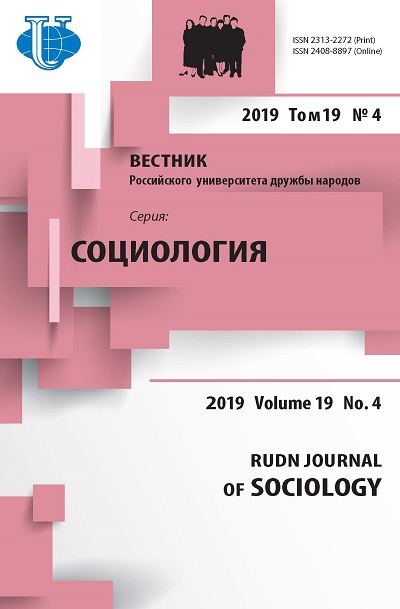The concept of social identity: Basic research approaches
- Authors: Podvoyskiy DG1, Soleimani S1
-
Affiliations:
- RUDN University (Peoples’ Friendship University of Russia)
- Issue: Vol 19, No 4 (2019)
- Pages: 825-834
- Section: Sociological lectures
- URL: https://journals.rudn.ru/sociology/article/view/22101
- DOI: https://doi.org/10.22363/2313-2272-2019-19-4-825-834
- ID: 22101
Cite item
Full Text
Abstract
Identity is one of the most complex and multidimensional terms of social sciences and humanities, which attracts attention of many intellectuals and researchers. We are social beings; thus, we have social identities. Our social life is impossible without a framework and basis for developing social and individual identities - without them no one can build meaningful or consistent relationships with other people. Social identity as the basis for identifying socially significant “similarities” and “differences” between individual and collective actors allows for continuous communication and sustainable interaction in the community. Explanations of social identity and factors influencing its cannot be limited to any theory or scientific school. Thus, the authors study the concept of social identity as defined by theories of macro- and micro-levels, and also by theories of social order and integration. The article starts with the macro-sociology theorists E. Durkheim and M. Castells and considers such concepts as “mechanical solidarity”, “organic solidarity”, “legitimizing identity”, “resistance identity” and “project identity”. The authors consider the views of representatives of the symbolic interactionism focusing on the concepts of “self” and “mind”, primarily in the theory of G.H. Mead; the ideas of Ch.H. Cooley based on the concepts of “looking-glass self” and “primary group”; the works of M. Rosenberg devoted to “self-concept”; the theories of H. Tajfel and A. Giddens describing identity and its varieties; and, finally, the views of P. Bourdieu and R. Jenkins. The authors conduct a kind of the preliminary comparison of the mentioned approaches to identify the features of their theoretical argumentation and the role of ‘identity’ in the theory of social order and theoretical-methodological dilemma ‘subject-structure’.
About the authors
D G Podvoyskiy
RUDN University (Peoples’ Friendship University of Russia)
Author for correspondence.
Email: podvoyskiy-dg@rudn.ru
кандидат философских наук, доцент кафедры социологии Российского университета дружбы народов; ведущий научный сотрудник Института социологии Федерального научно-исследовательского социологического центра Российской академии наук
Miklukho-Maklaya St., 6, Moscow, Russia, 117198S Soleimani
RUDN University (Peoples’ Friendship University of Russia)
Email: Soleimani.s@yandex.ru
аспирант кафедры социологии
Miklukho-Maklaya St., 6, Moscow, Russia, 117198References
- Belik A.A. Teoriya «Ya» G.H. Meada i psihologicheskaya antropologiya [G.H. Mead theory of “Self” and psychological anthropology]. Socialnaya Psihologiya i Obshchestvo. 2011; 1 (In Russ.).
- Bourdieu P. Prakticheskij smysl [Practical Reason]. Saint Petersburg; 2001 (In Russ.).
- Durkheim E. O razdelenii obshhestvennogo truda. Metod sociologii [The Division of Labour in Society. The Rules of Sociological Method]. Moscow; 1991 (In Russ.).
- Coser L.A. Mastera sociologicheskoj mysli: Idei v istoricheskom i socialnom kontekste [Masters of Sociological Thought: Ideas in Historical and Social Context]. Saint Petersburg; 2013 (In Russ.).
- Сооley C.H. Chelovecheskaja priroda i socialny porjadok [Human Nature and the Social Order]. Moscow; 2000 (In Russ.).
- Mead G.H. Izbrannoe [Selected Works]. Moscow; 2009 (In Russ.).
- Orlova E.A. Konceptsii identichnosti/identifikatsii v socialno-nauchnom znanii [Concepts of identity/identification in the social-scientific knowledge]. Voprosy Socialnoj Teorii. 2010; 4 (In Russ.).
- Simonova O.A. K formirovaniyu sociologii identichnosti [On the development of sociology of identity]. Sociologichesky Jurnal. 2008; 3 (In Russ.).
- Shmatko N.А. “Gabitus” v strukture sociologicheskoj teorii [“Habitus” in the structure of the sociological theory]. Zhurnal Sociologii i Socialnoj Antropologii. 1998; 1 (2) (In Russ.).
- Yakushina O.I. Identichnost v sociologicheskoj teorii E. Giddensa [Identity in the sociological theory of A. Giddens]. Sovremennye Problemy Nauki i Obrazovaniya. 2014; 2 (In Russ.).
- Blumer H., Morrione T.J. George Herbert Mead and Human Conduct. New York: Altamira Press; 2004.
- Castells M. End of Millennium. The Information Age: Economy, Society and Culture. Vol. 3. Oxford: Blackwell; 1998.
- Castells М. Globalisation and identity. A comparative perspective. Transfer. 2006; 1.
- Delaney T. Classical Social Theory: Investigation and Application. N.J.: Prentice Hall; 2004.
- Giddens A. Modernity and Self-Identity: Self and Society in the Late Modern Age. Cambridge: Polity Press; 2010.
- Jenkins R. Social Identity. London: Routledge; 2014.
- Tajfel H. Human Groups and Social Categories. Cambridge: Cambridge University Press; 1981.
Supplementary files













